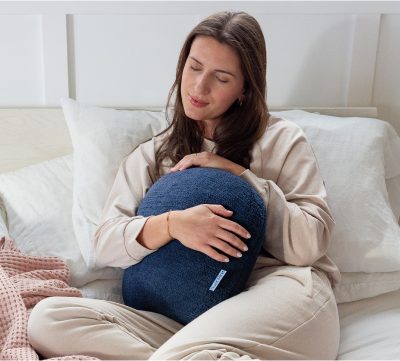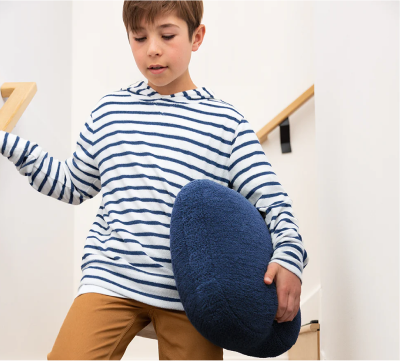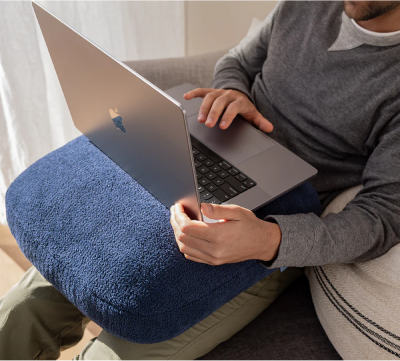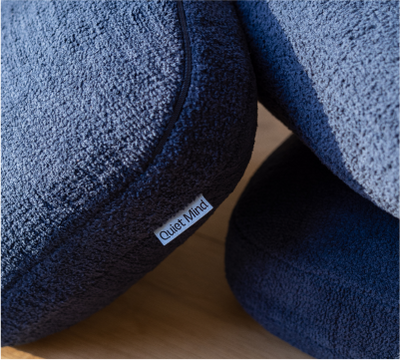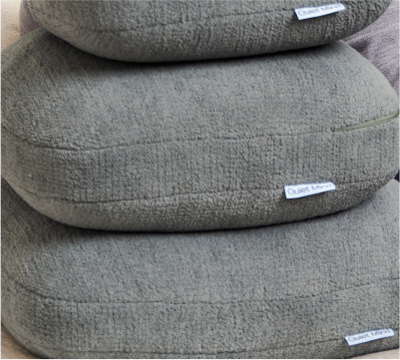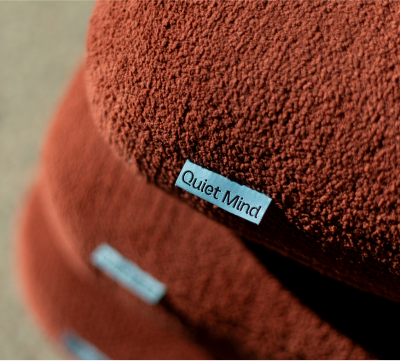Waking up with tingling or numbness in your hand or arm is common—especially if you sleep on your side. Often, it’s a sign that pressure has disrupted nerve signals or blood flow during the night.
In many cases, small adjustments to how you sleep can ease the discomfort. But persistent or frequent numbness may signal something deeper that deserves attention.
This guide explores the causes of nighttime numbness and offers practical, medically informed ways to relieve it—without compromising your comfort.
Key Takeaways
- Numbness while sleeping often results from pressure on nerves or blood vessels.
- Side sleeping positions can compress the ulnar or radial nerve, especially in the arms or hands.
- The right sleep setup—including pillows that reduce strain—can help prevent numbness.
- Frequent or worsening symptoms may point to a medical issue requiring evaluation.
Simple changes like stretching before bed and alternating positions can make a noticeable difference.
What Causes Numbness While Sleeping on Your Side?
Most nighttime numbness stems from mechanical pressure. When nerves or blood vessels are compressed, they can’t transmit signals properly—resulting in a tingling sensation known as paresthesia.
Pressure on Nerves and Blood Vessels
Sleeping on your side places pressure on the body’s soft tissues—particularly around the neck, shoulders, and arms. If you rest your head on an outstretched arm or curl into a tight position, you may compress nerves like the ulnar or radial, leading to tingling, numbness, or weakness.
Over time, even mild pressure can restrict circulation, leaving parts of your body feeling “asleep” until you shift positions.
Sleeping Position and Arm or Leg Compression
|
Position |
Effect |
|
Arm under head |
Compresses ulnar nerve at the elbow or wrist |
|
Knee between legs |
Pinched nerves in the thigh or calf |
|
Bent knees |
Reduces circulation to legs and feet |
Underlying Conditions That Increase Sensitivity
Some health conditions make nerves more vulnerable to nighttime pressure:
- Carpal tunnel syndrome – inflammation narrows the space around the median nerve
- Cervical spine issues – such as disc compression or misalignment
- Diabetic or alcoholic neuropathy – weakens nerve function overall
- Thoracic outlet syndrome – pressure in the shoulder or upper chest impairs circulation
In these cases, even normal pressure from side sleeping may cause numbness or discomfort.
Is It Normal to Wake Up with Numb Hands or Arms?
Mild numbness that fades quickly is usually harmless. But recurring or persistent symptoms could indicate a more serious issue.
When It’s Benign vs When It’s a Red Flag
|
Benign Signs |
Warning Signs (Red Flags) |
|
Numbness after sleeping in one position |
Numbness that occurs regardless of position |
|
Resolves within 1–2 minutes after moving |
Lasts for hours or occurs frequently |
|
Mild discomfort without other symptoms |
Accompanied by pain, weakness, or skin color changes |
If symptoms occur more than a few times per week, or begin interfering with daily function, it’s time to speak with a doctor.
How Side Sleeping Affects Your Nerves
Sleeping on your side can strain nerves in the shoulder, elbow, or wrist—especially if you tend to curl your arms or rest your weight unevenly.
Ulnar vs. Radial Nerve Compression in Sleep
- The ulnar nerve runs along your inner elbow. Sleeping with bent elbows for hours can compress this nerve. This can lead to numbness in your pinky and ring finger, known as “arms from falling asleep.”
- The radial nerve, near your upper arm, can also compress under your body weight. This can cause tingling in your thumb and index finger.
Common Patterns of Tingling and What They Mean
|
Nerve |
Affected Area |
Symptoms |
Possible Causes |
|
Ulnar Nerve |
Little and ring finger |
“Pins and needles,” temporary paralysis |
Bent elbow posture, sleeping on a hard surface |
|
Radial Nerve |
Thumb and index finger |
Sharp tingling, weakness |
Arm compression under your body |
Pay attention to where you feel numbness and how long it lasts. It’s your body’s way of signaling a need for adjustment.
How to Prevent Numbness While Sleeping on Your Side
Making subtle shifts in your sleep posture, support, and pre-bed routine can significantly reduce your risk of nerve compression and promote better sleep.
Proper Pillow and Mattress Support
- Choose pillows that keep your neck and shoulders straight. Memory foam or ergonomic pillows help avoid nerve pressure.
- Get a mattress that keeps your spine aligned. A firm or medium-firm mattress is best for your arms and shoulders.
- Use a small pillow under your upper arm to ease pressure. Use a weighted pillow to keep your arm gently in place throughout the night—without needing to grip or brace against tension
Ideal Arm and Shoulder Placement
- Place your top arm on a pillow between your torso and chest. Don't let it hang or press against the bed.
- Try sleeping on your back with your arms at your sides. This is less stressful than sleeping on your arm.
- Avoid crossing your arms or keeping them above your head. This can cause pain or make carpal tunnel worse.
Stretching and Mobility Exercises Before Bed
Simple stretches can improve circulation and ease nerve tension before sleep:
- Wrist stretch: Extend your arm, palm up, and gently pull fingers toward you
- Shoulder rolls: Loosen tension by rolling shoulders backward and forward slowly
- Neck tilt: Gently tilt head side to side to release pressure in the cervical spine
When to Consider Changing Your Sleeping Position
If numbness persists despite adjustments, changing your position may be necessary. Back sleeping, for example, naturally supports the spine and relieves pressure from the arms and shoulders.
Side Sleeping Variations That Put Less Pressure on Limbs
- Place a pillow between your knees to align your hips
- Elevate your upper arm with a weighted pillow to keep it from drifting forward or downward
- Rotate which side you sleep on to avoid long-term strain on one limb
Try Back or Semi-Prone Sleeping Instead
- Back sleeping: Keeps arms neutral and spine aligned
- Semi-prone: Sleeping slightly tilted, supported by pillows, combines pressure relief with familiar comfort
If you still experience numbness in these positions, consult a healthcare professional to rule out structural or neurological conditions.
When to Seek Medical Advice for Sleep-Related Numbness
If numbness is frequent, severe, or spreading, it may indicate nerve inflammation or damage that requires medical attention.
Signs You Shouldn't Ignore
- Numbness that lasts beyond morning or worsens over time
- Muscle weakness, coordination issues, or joint stiffness
- Swelling, discoloration, or sharp pain at night
- Loss of grip strength or fine motor control
Early diagnosis is important in preventing long-term damage. Nerve testing, imaging, or bloodwork may be used to uncover underlying causes.
About Quiet Mind
At Quiet Mind, we create tools to help you unwind, sleep deeper, and wake more balanced. For those who experience nighttime restlessness, tingling, or frequent position changes, our signature weighted pillows offer calming support that helps the body stay still—without strain.
Designed to ground the nervous system and promote natural relaxation, each Quiet Mind product blends gentle weight with sensory cues that tell your body: it’s time to rest.
FAQs
What causes numbness in hands while sleeping?
Numbness in your hands during sleep often happens when nerves or blood vessels are compressed as you fall asleep. This can be due to your sleeping position, especially if your hands or arms are bent or under pressure. Conditions like carpal tunnel syndrome, cervical spine problems, or poor circulation can also contribute.
Is it normal to wake up with numb hands or arms?
Sometimes, waking up with numb hands or arms is okay. It might happen if you sleep in a way that presses on nerves. But, if numbness happens a lot, or with pain or pins and needles, it could mean something serious. You should see a doctor then.
Does age increase the risk of numbness while sleeping?
Yes. As we age, both nerve sensitivity and blood circulation can decline. This makes it easier for pressure during sleep—especially in certain positions—to cause numbness or tingling. Older adults may also have underlying conditions like arthritis, diabetes, or spinal changes that increase the risk of nighttime nerve compression.
How can I prevent numbness when sleeping on my side?
To avoid numbness when sleeping on your side, use pillows and a mattress that support your body right. Also, move your arms and shoulders in different ways before bed. Stretching or doing mobility exercises can help too.
Do weighted blankets or pillows help reduce numbness?
In many cases, yes. Weighted products can encourage stillness and improve body alignment during sleep, which may reduce the chances of limbs going numb—especially if fidgeting or restless movements are a factor.
